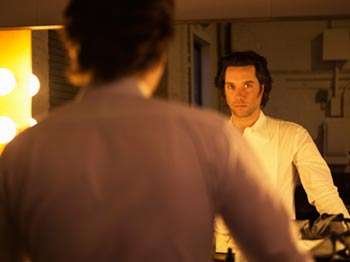|
Back
Prima! Rufus! Judy! Philadelphia
Verizon Hall
04/21/2013 -
Rufus Wainwright: Prima Donna, Concert Suite (libretto by R. Wainwright & B. Colomine)
Melody Moore (soprano), Katheryn Guthrie (soprano), Rufus Wainwright (vocals)
Peter Donovan (bass), Mark Hummel (piano), Steve Bartosik (drums), Chamber Orchestra of Philadelphia, Stephen Oremus (conductor)

R. Wainwright (Courtesy of PIFA)
The Philadelphia Festival of the Arts (PIFA) chose a time traveling theme and singer-composer Rufus Wainwright used the occasion to travel back to April 23, 1961 when Judy Garland made her most famous comeback with Prima! Rufus! Judy!. When he conceived the show five years ago, many thought he was on dangerous performance ground, especially since he was going to himself sing her entire concert play list, with the stylized orchestrations by Mort Lindsay. Garland’s voice was singular and what she did with these songs is indelible, but Wainwright, as he proved again in Philly, is able to conjure the magic of an icon and then, it’s all about the music, here with the Chamber Orchestra of Philadelphia, to give it full dimension.
But first was the concert suite from Prima Donna, the singer’s first opera. It is about a fictional soprano, Madame Saint-Laurent, who is semi-retired and her diva insecurities overtake her as she contemplates her return to the stage after a long absence. It was headed to premiere at the Metropolitan Opera, but his libretto was in French and they wanted him to present it in English, so that production was scrubbed, but has since had productions in London, Toronto, and last year at the Brooklyn Academy of Music.
The shakiest section may be the overture, which is decorated with too many things wending through. But when Melody Moore comes on in a 20-minute or so sopranic soliloquy, it all comes together. Wainwright not only writes with sumptuous vocal line, he writes within the aesthetic of French classicism, that lyrical line that just continues without showstopper arias. Moore is subtle, dynamic and vocally stunning. Stephen Oremus’ detailing of the surface orchestral beauty is potently paced with solid progressions in the horns, chamber counterpoint that appears and vanishes and unexpected percussion unique in opera.
Oremus, primarily a show conductor, hit those minted Lindsay arrangements in full swing and dimension for the Garland overture and the build-up to Rufus’ spilling out onstage in a black sequined label tux, bed-headed and breathless, aka Judy, and launched into When you’re smiling. Wainwright doesn’t try to sound like Garland, but he pays homage to her singular phrasing and dramatic approach to a song. And through the Judy play list he displayed his inner Judy in such showstoppers as Swanne, the Trolley Song, Chicago and San Francisco, but he impressed more in his stylizations of the ballads, The Man that Got Away, If Love We All and especially Over the Rainbow, the first verses of which he sang a capella and the orchestra coming in powerfully. On Do it Again, he reached for notes you never hear on his recordings. His relaxed air with the audience and energy with the orchestra and his show band gave a sense of musical occasion.
The audience’s vivid applause brought him back for three encores including Oh, What a World his hit from Poses with its Bolero inlay that just sounded so sublime with this orchestra. The two sopranos came on for a trio to John Cale’s anthem Hallelujah, with an understated somberness. Then Moore and Wainwright did the duet that became instantly iconic in gay culture, the counterpoint medley of the Garland classic Get Happy/Happy Days are Here Again that Garland performed, famously on her TV show with Barbra Streisand. This was, to say the least, a gay moment of high camp and grandeur.
Lewis Whittigton
|